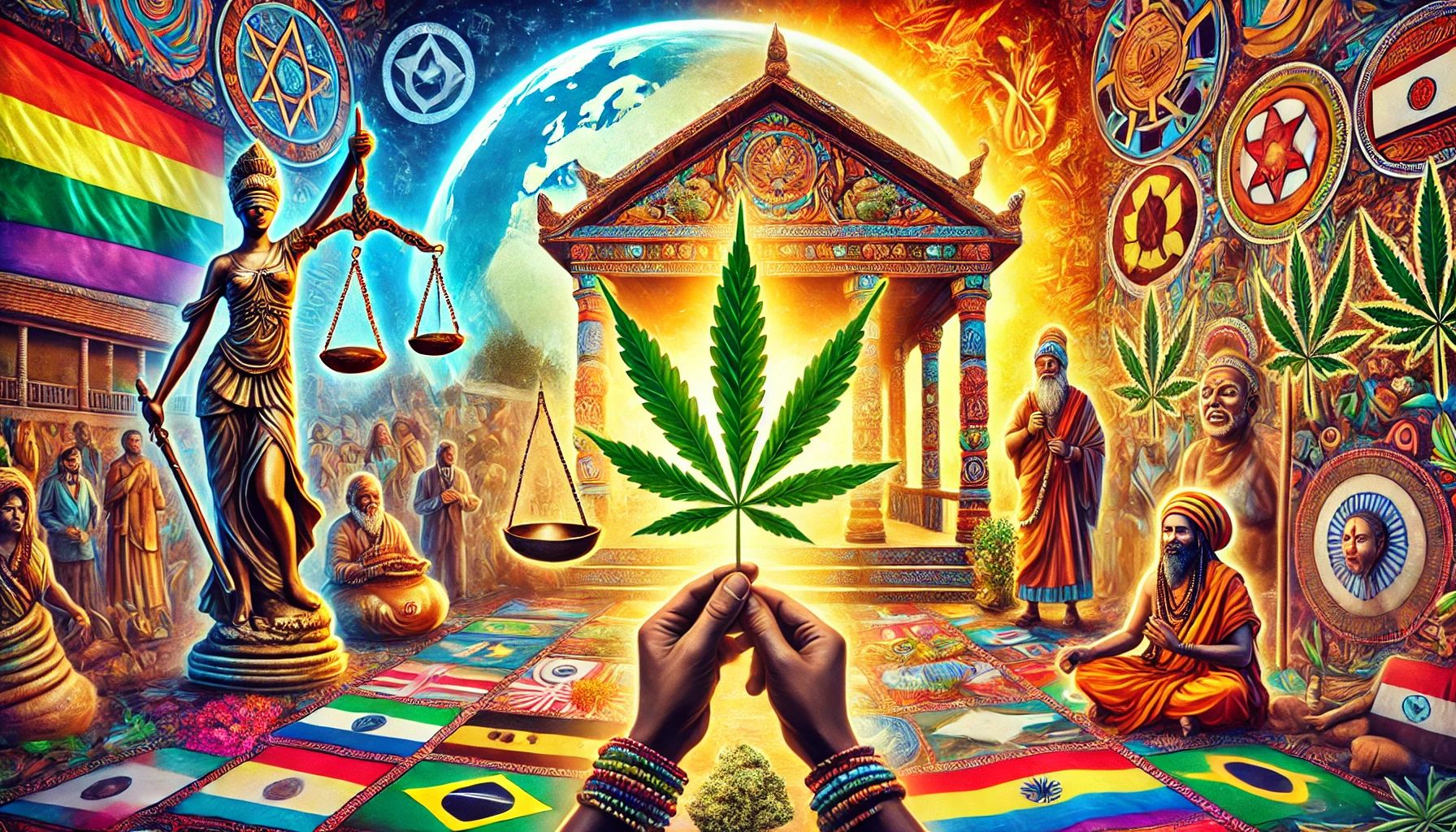
News Highlights:
Indian 🇮🇳 Regulations on Religious Cannabis: In Odisha, India 🛕, the local government has banned cannabis use at Hindu 🕍 shrines, though cannabis use has deep ties to Shiva worship 🧘♂️ in Hinduism. This ban showcases a shift where regional authorities prioritize legal norms over traditional religious 🕌 practices. Benzinga
Judaism ✡️ and Cannabis: Jewish communities have historically used cannabis for spiritual purposes, with some interpretations of Jewish law today even considering cannabis🍁 kosher under specific circumstances, such as for medicinal 👩🔬 purposes, but not recreationally. Grunge
China’s 🇨🇳 Tight Controls: China enforces stringent religious 📿 policies, often intervening in worship 🤲 practices, including prohibiting substances like cannabis. These restrictions illustrate the difficulty in negotiating religious rights under authoritarian 🖕 regimes. Pew Research Center

Quick 🗒️ Read:
Historic Roots 🍠 in Faith ⛪ – Cannabis holds ancient religious significance, with sacred ✝️ applications in Rastafarian 🥳 and Hindu practices, regarded as a tool for spiritual enlightenment and divine 👍 communion.
Legal Tensions 🤬 with Freedom of Religion – Governments 👮♀️ face complex challenges balancing religious freedoms and cannabis 🐸 restrictions, with exemptions varying widely by country 💂♂️ and often influenced by public health priorities.
Divergent Global Policies 🌐 – Countries differ in their stances, from Brazil's 🇧🇷 regulated allowances for ceremonial use to Japan's 🇯🇵 strict prohibitions, leaving practitioners in uncertain 🔍 legal territory.
Ethical Quandaries 🔫 of Legal Allowances 💭 – Exemptions provoke ethical debate: opponents fear 😱 misuse, while advocates argue for honoring deep-seated spiritual freedoms without government 🕵️ interference.
Crafting Fair Legislation 🏛️ – As cannabis 🥬 legalization spreads, the need grows for equitable policies allowing religious use while preventing potential abuse, calling for balanced, culturally sensitive ✨ legislation.

Religious 🎚️ Exemptions for Cannabis Use: Sacred Right or Legal Loophole 🔄?
The use of cannabis 💛 for religious practices has deep roots 🍆, spanning millennia and continents, from the Rastafarian rituals in Jamaica to Hindu Sadhu ceremonies in India. 🌍 However, as cannabis laws evolve 🐍 worldwide, governments face a moral quandary: should they honor centuries-old beliefs by allowing cannabis for spiritual rites, or do they maintain legal constraints to safeguard public health? ⚖️ At this intersection, the topic of religious cannabis exemptions surfaces as one of the most contentious debates 👩🏫 in modern law 👩⚖️.
For Rastafarians, cannabis is a sacred herb integral to their spiritual practices, seen as a means to connect with divinity and foster peace and togetherness. Legal frameworks around the world have challenged this belief, pressing Rastas to seek exemptions that honor their traditions without violating laws,"
The Sacred Herb: Reverence and Rituals 💫
Cannabis 🟢 has held spiritual significance for countless religious groups. For Rastafarians, it’s a divine sacrament 🕉️, believed to bring its users closer to Jah, or God 🙏. Similarly, Hindu Sadhus use cannabis to attain spiritual liberation, reaching beyond the bounds of the material world. In these contexts, cannabis is not merely a recreational substance 🌺 but a revered tool of connection and transcendence. It is embedded in rituals, blessings, and a commitment to the divine, imbuing cannabis 🌸 with a spiritual reverence that defies typical Western legal structures.
Legislative Landscape: Boundaries or Breaches of Freedom? 📜
Navigating 🛫 religious exemptions within cannabis laws has proven contentious for lawmakers worldwide. For instance, in the United States 🇺🇸, freedom of religion is constitutionally protected under the First Amendment ⚔️. This has provided a framework for religious groups to argue for exemptions. Nonetheless, as state and federal laws vary, religious adherents using cannabis 🍏 may encounter legal pushback depending on jurisdiction. Some countries, like Canada 🇨🇦, have hesitated to enact formal religious exemptions, citing concerns over public safety and uniform legal standards. Should nations recognize cannabis as a tool of religious liberty, or does it compromise 💔 overarching health protocols?

Global 🌏 Approaches: From Strict Enforcement to Measured Accommodation
Globally ↪️, responses to religious exemptions for cannabis are diverse and, often, polarizing. In Brazil ⚽, cannabis-based ayahuasca is permitted in certain religious ceremonies, under government-sanctioned agreements 🌿. In contrast, countries like France 🇫🇷 and Japan 🥢 implement strict anti-cannabis laws, regardless of religious context 🚫. The absence of a unified framework on religious exemptions leaves adherents exposed to legal uncertainty and potential punishment if they cross borders 👈👉 or reside in restrictive countries. Despite their spiritual beliefs, many find themselves confronted with inconsistent laws across various regions 🌍.
Ethical Dimensions: Respecting Beliefs or Enabling Evasion? 🌌
The ethical debate 🗣️ on religious cannabis exemptions often oscillates between safeguarding 🔑 individual rights and preventing potential abuse. Critics argue that allowing exemptions may blur the lines between genuine religious use and misuse, undermining the credibility of religious liberty protections 🚨. Conversely, supporters believe the government should not impose restrictions on deeply-held beliefs, as spirituality is an integral aspect of personal freedom 🌞. In countries like the Netherlands 🇳🇱, where regulated allowances exist, religious cannabis use is largely permitted and widely respected 🕊️. The delicate balance between respect for individual freedoms and maintaining legal standards remains an intricate challenge for policymakers worldwide 🎗️.

Moving Forward 👉: Crafting Equitable Policies
With cannabis 🌳 legalization expanding, so does the necessity to revisit laws governing religious exemptions. Legislators 👨🎓 are challenged to craft nuanced policies that respect spiritual practices without inadvertently opening doors to legal exploitation 🧭. Creating specific, structured guidelines for religious cannabis 🥝 use—such as requirements for formal religious identification, designated locations, or time-restricted use—could provide a workable compromise 🤝 for both advocates and critics 🔍. As the discourse continues, countries may face a tipping point 🌋 where policies will have to decisively protect both public welfare and sacred rights 🛡️.
In your opinion, should governments 🏢 allow ✝️ religious ✡️ exemptions for cannabis use, or would this lead to a weakening of legal standards?'
🧘 Trust The Process 💞

The information provided in this newsletter is for informational purposes only and does not constitute medical, legal, or professional advice. Always consult with a qualified professional before making any decisions based on the content shared here.
